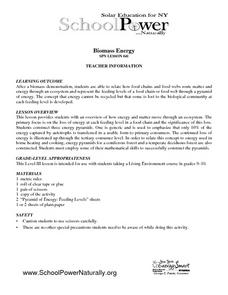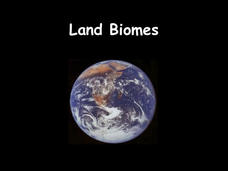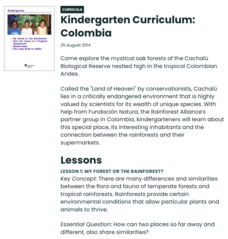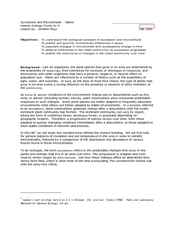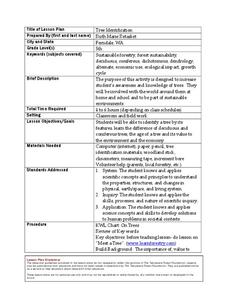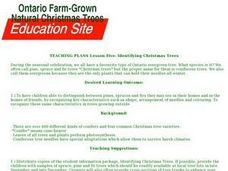Curated OER
All About Trees
Second graders examine the artwork of Robert Harris and discuss how trees are an important part of their lives. In groups, they discover how people's use of the environment has changed over time and describe the climate and vegetation...
Curated OER
Squigly's Tree Word Search
In this word search activity, learners locate 24 words related to trees. The word list includes ash, birch, branches, and coniferous.
Curated OER
Forests of the World
In this forests worksheet, students read a one page informational excerpt on different forests throughout the world. They then use what they learned to answer the 20 questions on the worksheet. The answers are on the last page of the...
Curated OER
The Water Cycle: Transpiration
Students identify and describe the stages in the water cycle. Using plants, they determine if they play a role in the cycle and measure the water the plants give off. They complete an experiment to determine if deciduous or coniferous...
Curated OER
Arbor Day Challenge
In this finding words about Arbor Day worksheet, students use the Word Bank to locate the words in the word search. Students find 39 words.
Curated OER
The Prairie Climate
Ninth graders research the average temperature and precipitation of a prairie region to determine the type of climate it is, and how it differs from other biomes. They examine the types of adaptions animals have made to live in the...
Curated OER
What Causes Day and Night?
Why do we have four seasons? A series of questions about the Earth's orbit and its impact on seasons challenge Earth science students.The second page of the resource has nine multiple choice questions, such as "One year on Earth is one...
Curated OER
Biomass Energy
Junior ecologists relate how food chains and food webs route matter and energy through an ecosystem. They trace feeding levels of a food chain or food web through a pyramid of energy. As a reinforcement activity, learners construct three...
Curated OER
Hunt the Fact Monster Hunt #22
In this internet research worksheet, students use the internet to answer ten questions. Six of the questions are multiple choice, four are short answer questions.
Rainforest Alliance
My Forest or the Rainforest?
The differences between tropical and temperate rainforests range from animals and flowers to climate and landscapes. Kindergarteners compare and contrast characteristics of their local forest to a tropical rainforest.
University of Georgia
Land Biomes Project
Challenge scholars to research a biome and create a presentation for the producers of Survivor to choose their ecosystem for the next season's show. The materials include outlines, worksheets, and grading rubrics for individuals as well...
Biology Junction
Land Biomes
Biomes share similar climates and ecosystems, despite being separated geographically on the planet. A presentation introduces the six most common land biomes. It focuses on the commonalities in climate, plants, and animals with many...
Curated OER
My Forest or the Rainforest?
Students explore the flora and fauna of temperate forests and rainforests. They examine the environmental conditions that allow certain plants and animals to live in the rainforest.
Curated OER
My Tree Book
Students "adopt" a tree and throughout the year record and examine its characteristics and the changes that it goes through.
Curated OER
Using Technology in Science
You can spice up your science content by incorporating technology into your lesson plans.
Curated OER
Making a Food Web and Learning About Ecosystems
Third graders examine the difference between a food web and food chain. They also examine the importance of the sun in a food web and food chain. Students understand what happens when you remove parts of the chain.
Curated OER
Succession and Microclimate
Students compare the population of insects in different microclimates. In this biology lesson, students collect data using probes to tabulate temperature and soil data. They predict how certain parameters change as an area goes...
Curated OER
Biome Map
In this biomes instructional activity, learners color the map of North America according to the biome clues. Students then answer questions about the North American biomes.
Curated OER
Tree Identification
Students list four ways to identify trees. In this tree identification instructional activity, students use tree identification techniques such as leafs, bark, wood grain, soil type, and climate to create tables and graphs.
Curated OER
Lesson Five: Identifying Christmas Trees
Stuudents distinguish between pines, spruces and firs they may see in their homes, by recognizing key characteristics such as shape, arrangement of needles and colouring. They recognize these same characteristics in trees growing outside.
Curated OER
Land Associations
Students identify and explore life forms of various biomes, define transitional regions, examine effects of abiotic and biotic interactions, research a biome, and produce newspaper that features environmental information. Lessons all on...
Curated OER
Fields, Meadows, and Hedgerows: Trees, Bushes, and Plants
For this trees, bushes, and plants worksheet, students gather facts and answer short answer questions about trees, bushes, and plants. Students complete 8 questions total.
Curated OER
Anatomy of a Stream
In this stream worksheet, students access a website to explore the different parts of a stream. Students complete 7 short answer questions based on the information found on the website.
Curated OER
Identifying Trees Using Their Leaves in the Summer
Students discover how to identify trees. For this research lesson students use dendrology to decipher what a trees classification is and explore each trees traits.
Other popular searches
- Coniferous Deciduous Trees
- Deciduous and Coniferous
- Deciduous vs Coniferous
- Deciduous Coniferous
- Deciduous + Coniferous









